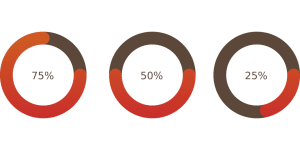Does anyone remember the old commercials for those ready-made weight-loss shakes? All you had to do was replace two meals a day with that chocolatey beverage, eat a “sensible” dinner, and you’d be on your way to a slimmer you, right? Well, probably not. Even if skipping those meals helped you shed a few pounds initially, that type of weight-loss program simply isn’t sustainable; nor are programs that require you to buy special food that you aren’t going to eat forever. Once you are no longer replacing those meals with shakes, or buying that special food, you’re probably just going to put that weight back on – sorry to be weight-loss program party poopers!
But those types of weight-loss programs are certainly not your only choice, especially not nowadays, when weight loss is a booming industry. In fact, maybe there’s so much information and so many options out there, that you just don’t know where to even start if you’re looking to lose weight.

Could the answer be one of the newest things in weight-loss trends: psychologically-based weight loss programs? After all, using methods backed by psychology means making positive, sustainable changes to your everyday life, not just replacing meals that you’ll eventually start eating again, and going to meetings that you’re bound to start skipping. Sounds pretty good – but how do they work, and are they the real future of lasting weight loss?
What Does Psychologically-Based Mean?
So you might or might not remember the commercials for those weight-loss shakes, but how about something newer: have you seen commercials for an app called Noom? This app promises sustainable weight loss based on a psychological approach; their program is reliant on behavioral psychology, which they claim is the key to shedding the pounds for good.
And it looks like they’re on to something. While there haven’t been many studies of psychologically-based weight loss programs yet, one study that focused on diabetics found that Noom specifically helped participants achieve significant weight loss compared to a control group, and that they kept off the weight for at least a year. And another found that 80% of Noom users lost weight when they stuck with the program for an average of close to 300 days.
Pretty promising stuff – and that’s probably because psychologists have been using Cognitive Behavioral Therapy (CBT), which psychologically-based weight-loss programs draw from, to help people overcome challenges in their life for a long, long time. And what greater challenge for some people than losing weight and keeping it off?
So if CBT is one of the major components of weight-loss programs like NOOM, what does that mean? Well, the American Psychological Association (APA) says that CBT is based on three core principles:
- Psychological problems are based, in part, on faulty or unhelpful ways of thinking.
- Psychological problems are based, in part, on learned patterns of unhelpful behavior.
- People suffering from psychological problems can learn better ways of coping with them, thereby relieving their symptoms and becoming more effective in their lives.
In other words, behavioral psychology aims to understand why we behave the way we do and to analyze patterns in our actions and behaviors. And, since a lot of experts believe that the perceived barriers to weight loss are just as important as the actual things keeping us from tackling our weight problems, this approach might be just what a lot of people who are struggling need.
Are Apps the Answer?
So how do behavioral psychology and weight loss meet in the real world? Well, you can seek out a therapist who specializes in behavioral therapy and use it to help those who are struggling to lose weight. But, if that’s not on the cards for you right now, there are now, as we have already pointed out, apps that claim to be the solution.
Let’s take Noom, for example – one of the most well-known and most used (in fact, Noom was the most-searched diet term on Google in 2018) psychologically-based weight loss apps out there. While we haven’t tried it as a weight loss tool ourselves, reviews and descriptions of this app make it sound – how shall we say? – not all that innovative, or different from other tech-based approaches to weight loss.
Here’s how it works: you set up an account, and start your program by answering a series of questions on the app about your current weight, your goals, your health concerns, and your lifestyle (like how sedentary you are, whether you cook or eat out, etc). You’ll then be given a coach (who they claim is a real person) and a personalized eating plan, as well as access to tools that help you track your food, fitness, blood sugar levels, and blood pressure. You will also be given advice as you go, which seems to come mostly in the form of quizzes and short tips.
One of the main complaints about the app seems to be that the coaches don’t actually seem all that available, chatty, or even human (they can often give canned answers that seem a bit bot-like), according to some reviews, and they’re not registered dieticians, or counselors/therapists, as far as we can tell.
So it doesn’t seem that the app is all that centered on getting to the root of your weight loss barriers – but the minimal data out there does point to its effectiveness as we’ve already said. That might be because it’s simply another form of accountability among many to choose, since the app does ask you to log everything you eat and weigh yourself regularly, so tracking every bite you eat could help you to see where you need to make changes and eat healthier, and seeing your weight fluctuate could help you know when you’re off track.
In addition, its system encourages you to eat nutrient-dense foods that are lower in calories (like leafy greens), and often seems to suggest a very low caloric intake for a lot of people. In fact, some more of the complaints about the app seem to focus on how few calories it suggests (some users say they were encouraged to eat less than 1200 calories a day, which is far too few for an adult!), and on the fact that it doesn’t recognize the fact that there are some serious health (and even weight loss) benefits to some foods higher in fat and calories, like nuts, seeds, and avocados.
Not only that, but the focus on food tracking and weighing could be problematic for people who have had issues with disordered eating, so it’s important to know what could be triggering for you.
So, it seems that the bottom line about apps like Noom is that they’re limited in some ways, because, well, they’re apps! They can offer you great tech resources like food and fitness trackers, prompts for weigh-ins, and advice on mindful eating to read, but they can’t really do much more.
How You Can Incorporate Behavioral Psychology in Your Weight Loss Journey
The bottom line is, Noom or another paid app might be helpful for you, but you can probably find many of the same features in free apps. And as for the psychological part? Well, you might want to try incorporating some of your own psychologically-based strategies into whatever other tools you’re using on your weight-loss journey. For example, consider the following tips:
1. Set goals
When it comes to losing weight, it turns out that simply eating better and exercising (the physical stuff) is not the only thing you should be focusing on. One of the most important things you can do is something psychologically-based: setting goals for yourself. In fact, there are actually studies that show that setting goals frequently in your life makes you more likely to implement changes, and so setting goals as you work towards weight loss could help you get where you want to be and stay there.
So how many and what kind of goals should you be setting? There’s no data on how many goals, and the jury is out on how specific they have to be, but studies seem to suggest they should be on the bigger side. More important, though, is that they are challenging and/or set publicly; it also seems to be helpful to set group goals, so you might want to get your friends involved (see below)!

2. Track those goals
So here’s where apps can be helpful in a psychologically-based weight loss program. Science does seem to back up the effectiveness of tracking what you’re eating and weighing yourself regularly. In fact, if it’s not triggering for you, studies suggest that you should be weighing yourself weekly, if not daily. In addition, you need to find a sustainable way to track the food you’re eating (which can be time-consuming and annoying!). One way to do this might be to compromise and track faithfully while you’re first starting out, then ease up when you’ve hit a goal – but go back to tracking if your weight goes back up again.
3. Find social support
Setting goals and tracking your eating are two ways to keep yourself accountable, but you’ll also need a third accountability component: social support. Research has shown that people who talk to people in their lives about their goals, and/or do weight loss programs with a friend or family member, are much more likely to be successful. So get someone else on board!
Losing weight can be incredibly difficult. If it wasn’t, there wouldn’t be so many people struggling to do so, and there wouldn’t be so many “solutions” out there promising to help! But we do know now that using behavioral psychology to aid in your weight loss journey can actually work – you just need to find a way that will work for you. That might be with an app or other program, or simply incorporating some of the strategies above into your life yourself. However you choose to do it, keep at it – we know you can do it!




